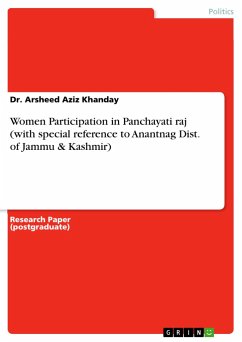Master's Thesis from the year 2017 in the subject Politics - Other International Politics Topics, grade: 2.1, , course: M.A.(Development Practice), language: English, abstract: Safe and sustainable sanitation is a sine qua non for ensuring community health, economic well being and realizing the benefits of demographic dividend. Safe sanitation is vital to prevent faecal-oral diseases widely prevalent amongst communities practicing traditional sanitation methods. Insanitation while being harmful to human health is also against the dignified living conditions. Approximately 2.6 billion people are without access to basic sanitation across the globe. Rural India is faced with even greater challenge of insanitary conditions where millions of masses lack access to basic sanitation facilities and roadside open defecation and urination is commonplace due to widespread poverty, ignorance, and cultural barriers and myriad of other factors. Inadequate sanitary facilities impede free functioning of the individuals in several other spheres of life and impose undesirable restrictions on the social status, mobility; political influence including economic losses. Sanitation is closely linked to the socio-economic conditions of the masses prevailing in rural India. The widespread poverty, lack of secure income and infrastructural deficiencies pose hindrances in building and accessing sanitation facilities for a large number of people. Insanitation also augments gender bias and poses difficulties to the womenfolk in a multitude of ways, women in rural India, as in most parts of the world, often suffer from lack of privacy, harassment and need to walk large distances to find a suitable place for defecation in the absence of household latrines. Recognising the imperative of achieving complete sanitation for all these vulnerable communities in a time bound manner the UN Sustainable Development Goals 6 and specifically target 6.2 seeks to achieve access to adequate and equitable sanitation and hygiene for all and end open defecation, paying special attention to the needs of women and girls and those in vulnerable situations by 2030. Behavioural issues and cultural barriers often undesirably inhibit communities to access safe sanitation.
Hinweis: Dieser Artikel kann nur an eine deutsche Lieferadresse ausgeliefert werden.
Hinweis: Dieser Artikel kann nur an eine deutsche Lieferadresse ausgeliefert werden.








